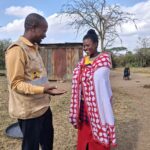
By Aghan Daniel
A leading young South African farmer has called on seed companies to embrace partnerships with farmers and invest in creating awareness on certified seed to strengthen seed systems in the continent in the face of climate change.
While addressing the opening session of the International Seed Federation (ISF) Congress in Cape Town today, South Africa, Gugulethu Mahlangu, noted that farmers have not fully embraced certified seed because of poor knowledge on seeds as the foundation of agriculture which hold within them the promise of new beginnings, growth, and abundance.
Gugu noted that the impacts of climate change continue to have adverse effects on seed production yet seed companies hardly discuss it with farmers.
Experts say that climate change has manifested itself in agriculture where shorter growing seasons are being experienced. Besides net crop revenues are predicted to fall by 90 per cent in Africa by 2100. On food security, maize crop yield will drop by 40% by 2050 yet 300 million Africans depend on maize as a main food crop.
She noted that for this situation to be reversed, there is need to invest in research and development to breed and adapt crop varieties suitable for and the unique conditions faced by farmers like her.
Her statements come at a time when experts have continually noted that the adoption of new seed varieties is hardly 30 per cent on average due to limited access to reliable information and quality control mechanisms that make it difficult for small scale farmers to differentiate between genuine and substandard seeds; lack of knowledge and information as many small farmers have limited awareness of the benefits of using quality seeds and may not possess the necessary knowledge to select, store, and manage seeds effectively. This lack of information hampers their ability to make informed decisions and maximize the potential of their agricultural practices.
According to the Secretary General of ISF, Mr Michael Keller, African farmers potential and resilience are unstoppable and only needs to be nurtured to meet the continent’s food requirements. He called on all players to work together to achieve this fete through bold initiatives that will unlock and transform the sector.
Ms Mahlangu, who is in her 20s, also called on collaboration with seed companies, Non Governmental Organisations, and government to provide training, resources, and access to quality seeds for farmers through partnerships and innovations.
“We need policies that support small farmers and prioritize their access to quality seeds,” she told the gathering of nearly 1200 seed people drawn from all over the world.
She also vouched for promotion of fair and equitable seed systems that empower women farmers, to actively participate in shaping their own future.
“Seeds are more than just tiny vessels of life; they are carriers of knowledge, culture, and resilience. For small farmers, the quality, accessibility, and diversity of seeds are of utmost importance,” added Mahlangu.
However, to fully unlock the potential of and empower our small farmers, she said that there was need to recognise the critical role of seeds.
Currently many farmers in South Africa and Africa in general, face significant challenges in accessing good quality seeds.
As a farmer she said the cause of the current situation is due to limited availability of seed as suppliers focus on high-demand commercial varieties, neglecting the needs of small-scale farmers who require locally adapted, traditional, or indigenous seed varieties.
On cost, she observed that quality seeds that offer higher yields and disease resistance are expensive, making them financially inaccessible for small farmers with limited financial resources.
Ms Mahlangu noted that regulatory barriers were real in the continent and that complex regulations and seed certification processes can create barriers for small farmers to access quality seeds. Compliance with formal seed certification requirements can be challenging for if the seed industry doesn’t focus on awareness and education.








